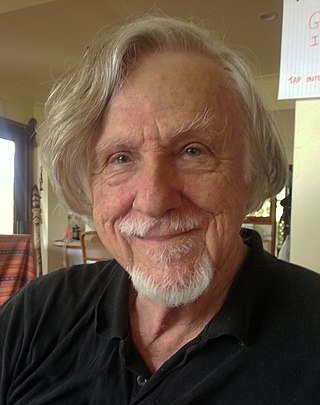Related Research Articles

The National Film Board of Canada is a Canadian public film and digital media producer and distributor. An agency of the Government of Canada, the NFB produces and distributes documentary films, animation, web documentaries, and alternative dramas. In total, the NFB has produced over 13,000 productions since its inception, which have won over 5,000 awards. The NFB reports to the Parliament of Canada through the Minister of Canadian Heritage. It has bilingual production programs and branches in English and French, including multicultural-related documentaries.

William Norman McLaren, LL. D. was a Scottish Canadian animator, director and producer known for his work for the National Film Board of Canada (NFB). He was a pioneer in a number of areas of animation and filmmaking, including hand-drawn animation, drawn-on-film animation, visual music, abstract film, pixilation and graphical sound. McLaren was also an artist and printmaker, and explored his interest in dance in his films.
Roman Kroitor was a Canadian filmmaker who was known as a pioneer of Cinéma vérité, as the co-founder of IMAX, and as the creator of the Sandde hand-drawn stereoscopic 3D animation system. He was also the original inspiration for The Force. His prodigious output garnered numerous awards, including two BAFTA Awards, three Cannes Film Festival awards, and two Oscar nominations.

Arthur Lipsett was a Canadian filmmaker with the National Film Board of Canada. His short, avant-garde collage films, which he described as "neither underground nor conventional”, contain elements of narrative, documentary, experimental collage, and visual essay. His first film, Very Nice, Very Nice, was nominated for an Academy Award.
Robin Spry was a Canadian film director, producer and writer. He was perhaps best known for his documentary films Action: The October Crisis of 1970 and Reaction: A Portrait of a Society in Crisis about Quebec's October Crisis. His 1970 film Prologue won the BAFTA Award for Best Documentary.

Michael Dattilo Rubbo is an Australian documentarian/filmmaker.
Colin Archibald Low was a Canadian animation and documentary filmmaker with the National Film Board of Canada (NFB). He was known as a pioneer, one of Canada's most important filmmakers, and was regularly referred to as "the gentleman genius". His numerous honors include five BAFTA awards, eight Cannes Film Festival awards, and six Academy Award nominations.
The Living Stone is a 1958 Canadian short documentary film directed by John Feeney and produced by the National Film Board of Canada. It shows the inspiration behind Inuit sculpture, where the aim of the artist is to release the image he or she sees imprisoned in the stone. Among its numerous honours was a nomination, at the 31st Academy Awards, for Best Documentary Short Film.
Eskimo Artist: Kenojuak is a 1964 Canadian short film about Inuk artist Kenojuak Ashevak, directed by John Feeney and produced by the National Film Board of Canada (NFB). It won the BAFTA Award for Best Short Film in 1964 and, in 1965, was nominated for the Academy Award for Best Documentary Short Film.
Evelyn Lambart was a Canadian animator and film director with the National Film Board of Canada, known for her independent work, and for her collaborations with Norman McLaren.

Thomas Cullen Daly was a Canadian film producer, film editor and film director, who was the head of Studio B at the National Film Board of Canada (NFB).
John Kemeny was a Hungarian-Canadian film producer whom the Toronto Star called "the forgotten giant of Canadian film history and...the most successful producer in Canadian history." His production credits include The Apprenticeship of Duddy Kravitz, Atlantic City, and Quest for Fire.

Albert Kish was a Canadian documentarian/filmmaker.
Robert Verrall was a Canadian animator, director and film producer who worked for the National Film Board of Canada (NFB) from 1945 to 1987. Over the course of his career, his films garnered a BAFTA Award, prizes at the Cannes Film Festival and Venice Film Festival, and six Academy Award nominations.
Guy Glover was a senior National Film Board of Canada (NFB) producer and administrator who was born in London, U.K. and died in Hudson, Canada.
Herring Hunt is a 1953 short documentary film directed by Julian Biggs and produced by the National Film Board of Canada (NFB).
Julian Biggs (1920–1972) was a director and producer with the National Film Board of Canada and its first Director of English Production. Over the course of his 20-year career, he created 146 films, two of which were nominated for Academy Awards. His film 23 Skidoo (1964) received two BAFTA nominations, including the BAFTA United Nations award.
The 7th Canadian Film Awards were announced in 1955 to honour achievements in Canadian film.
The 2nd Canadian Film Awards were presented on April 19, 1950 to honour achievements in Canadian film. The ceremony was hosted by Prime Minister Louis St. Laurent.
Morten Parker was a Canadian director, producer and writer.
References
- ↑ "The Rising Tide". onf-nfb.gc.ca. National Film Board of Canada. Retrieved April 5, 2023.
- ↑ "The Rising Tide". coady.stfx.ca. St. Francis Xavier University Coady Institute. Retrieved April 5, 2023.
- ↑ "The 22nd Academy Awards (1950) Nominees and Winners". oscars.org. Archived from the original on July 6, 2011. Retrieved August 18, 2011.
- ↑ "NY Times: The Rising Tide". Movies & TV Dept. The New York Times . 2011. Archived from the original on June 18, 2011. Retrieved November 24, 2008.
- ↑ "The Rising Tide". youtube.com. YouTube. April 24, 2018. Retrieved April 5, 2023.